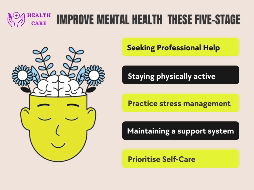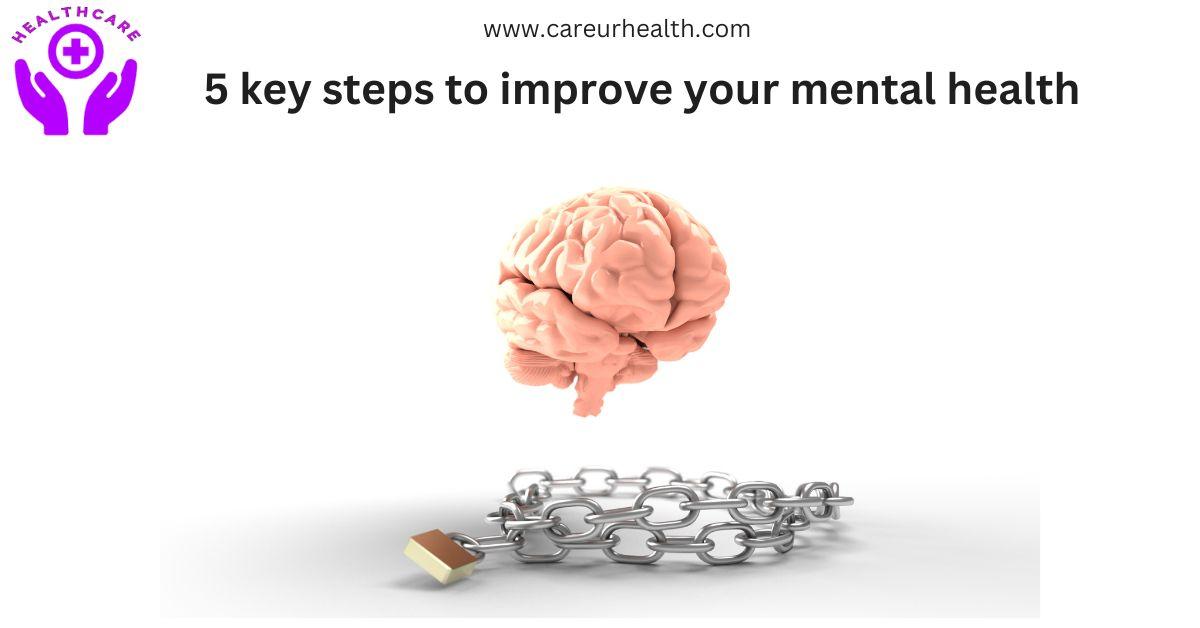In the fast-paced, contemporary society we live in, taking care of our mental health has become crucial. Life’s turbulent waves may frequently leave us feeling overburdened, worried, and cut off from our inner selves. The good news is that we can seize the initiative and set out on a path to better mental health.
In a world full of ongoing problems, this article explores the crucial measures that might help you develop a healthier, more resilient mind. It serves as a beacon for anyone looking to find equilibrium, tranquility, and satisfaction.
We’ll examine five key stages that can lead to personal development and well-being as we navigate the ever-changing field of mental health. These actions include both tried-and-true methods and cutting-edge procedures that might significantly improve your mental health.
These actions—which range from promoting self-awareness and practicing mindfulness to developing a solid network of allies and making good lifestyle adjustments—are founded on both academic study and personal experience.

The article that follows will provide insightful information and helpful tips, whether you’re trying to reduce stress or anxiety or just want to improve your general mental health.
“So come along as we embark on this life-changing adventure to discover the keys to a healthier, happier self. Your total well-being depends on you taking better care of your mental health”.
Here are five essential actions to improve your mental health:
Seeking Professional Help:
This is a crucial first step in enhancing your mental health, particularly if you are dealing with severe emotional discomfort, mental illnesses, or other issues that are having a substantial negative influence on your well-being. Here is a more thorough justification:
Getting professional mental health assistance entails speaking with educated professionals like therapists, counsellors, and psychiatrists. These specialists are prepared to offer a variety of therapies, such as counselling and, occasionally, medication.
- Therapists and counsellors: These healthcare providers provide a range of talk therapies or counseling that can assist you in comprehending and controlling your feelings, ideas, and actions. For instance, cognitive-behavioral therapy (CBT) is successful in treating illnesses like anxiety and depression.
- Psychiatrists: When required, these medical professionals can write prescriptions for drugs. To manage disorders like bipolar disorder, schizophrenia, or severe depression, medication might be useful.
- Professional assistance has several advantages. Professionals in the mental health field have significant education and training in diagnosing and treating psychological problems. They offer an unbiased viewpoint, which aids in your ability to understand and make sense of the issue.
- You get coping mechanisms, problem-solving abilities, and distress management approaches from them. Your issues and feelings can be discussed in a private, nonjudgmental setting during therapy sessions.
- Professionals personalize your therapy to meet your specific needs, resulting in a highly successful intervention.
Always keep in mind that asking for expert assistance indicates strength, not weakness. It’s a proactive move in the direction of enhancing your mental and general well-being.
If you’re not sure where to begin, ask your primary care physician for a recommendation or seek advice from mental health organizations and hotlines.
Staying physically active :
Maintaining and enhancing healthy mental health requires staying physically active. Your mental health can benefit greatly from regular exercise. Your body produces chemicals known as endorphins when you exercise.
These hormones are frequently referred to as “feel-good” hormones because of how much they may improve your mood. They have natural sedative and mood-enhancing properties that help lessen tension and anxiety.
“Exercise is an excellent stress management technique. It causes the release of neurotransmitters that encourage relaxation and aid in reducing the synthesis of stress hormones like cortisol. This may cause your anxiety to lessen and your mental health as a whole to improve”.
Regular exercise can lengthen and increase the quality of your sleep. The capacity to handle everyday challenges and maintain emotional stability is improved by getting enough sleep.
Any fitness objective you accomplish may increase your self-confidence and self-esteem. This sensation of achievement can have a favorable effect on your mental well-being and self-perception.
Group fitness courses and team sports are only two examples of the numerous exercise options that offer social connection. By lowering feelings of loneliness and isolation, connecting with people and socializing help promote mental health.
It’s not necessary to engage in intense exercise to get physical activity into your daily routine; even a quick stroll, yoga, or gardening will help. Consistency is crucial since regular exercise may have a significant, beneficial influence over time.
Practice stress management
Practice stress management since it is essential for enhancing mental health because long-term stress can have a detrimental effect on your emotional well-being.
Stress is a normal reaction to difficult circumstances, but when it persists or is too great, it can result in several mental health conditions, including anxiety and depression. Learning coping mechanisms and practices for stress reduction and management is essential.
- Observing your thoughts and feelings without passing judgment is a key component of mindfulness meditation. This routine can make you more sensitive to stress and more capable of handling it.
- Deep, slow breathing can cause the body to go into a state of relaxation, which lessens the signs of stress on the body and the mind. Particularly effective methods include diaphragmatic breathing.
- The progressive muscle relaxation method gradually tenses and relaxes various muscle groups throughout the body. Physical stress can be relieved, and a calmer state of mind can be fostered.
- Yoga incorporates breathing exercises, meditation, and physical postures. It is well-recognized for lowering stress levels by encouraging relaxation and increasing flexibility.
- By incorporating these stress-reduction strategies into your daily routine, you may strengthen your resistance to stress’s damaging effects. A calmer mind, more emotional stability, and greater general mental health can result from regular practice.
- To successfully manage stress and promote your mental health, it’s critical to identify the techniques that suit you best and incorporate them into your daily routine.
Maintaining a support system
Keeping a support network in place is essential for enhancing and defending your mental health. To do this, you must actively seek the assistance of close friends, family members, and other trustworthy people in your life.
“A sense of belonging and emotional connection are provided through establishing and maintaining connections with people. With the support of trusted people, you may process your feelings and learn to deal with life’s difficulties”.
Your support system may help you feel heard and appreciated by providing understanding and validation. These people may show empathy when you share your feelings and worries, which helps reduce tension and anxiety.
It’s easy to feel lonely and alone when you’re going through a difficult period. By reassuring you that you’re not alone in your troubles and that people care about your well-being, friends, and family may help you fight this isolation.
Your network of supporters may also provide you with a variety of viewpoints and answers to any issues you might be having. They may be able to provide you with direction and useful counsel as you negotiate difficult circumstances.
Your emotional resilience is increased when you have a support system, which makes it simpler to recover from setbacks. Your confidence and sense of self-worth might increase when you know that others are rooting for you.
“Having a support structure in place makes sure you have a safety net for when things go tough and adds to your sense of closeness and well-being”.
Prioritise Self-Care
Prioritize self-care; a crucial component of enhancing your mental health is making conscious efforts to take care of your physical, emotional, and mental needs. Recognizing your own needs and actively partaking in activities that advance your well-being are examples of practicing self-care.
It’s a proactive strategy for preserving and enhancing your mental well-being. Taking good care of your body is part of physical self-care. It entails receiving adequate amounts of restful sleep, eating a balanced diet, and exercising frequently.
These activities can enhance your physical well-being, which has a profound effect on your mental health. You must comprehend and process your emotions to practice emotional self-care.
It involves accepting your feelings without passing judgment on them and discovering constructive channels for doing so, such as keeping a journal, speaking with a friend, or consulting a counsellor.
- The main goal of mental self-care is to maintain mental acuity and interest. Reading, picking up new skills, or engaging in mindfulness and meditation exercises can all contribute to stress reduction and improved mental clarity.
- Understanding when to say no is a crucial component of self-care. To avoid taking on too much and being overcommitted, limits must be established.
- Take part in enjoyable and relaxing activities. You may unwind and recharge by engaging in any of these activities, including hobbies, art, music, and outdoor activities. Self-care ultimately entails prioritizing your health and well-being in a balanced manner.
- You get the ability to control stress, develop resilience, and uphold your mental health. The secret to an effective self-care regimen is to tailor it to your requirements and tastes.

Conclusion
In conclusion, putting your mental health first and enhancing it are worthwhile endeavors. You may use the five essential stages listed in this article as a helpful road map to help you get started on the path to a happier and more resilient state of mind.
“By including these practices in our everyday routines, we start along the path to mental and emotional balance. It’s critical to keep in mind that maintaining mental health is a lifelong effort that calls for tolerance and self-compassion”.
By investing in our mental health, we give ourselves the skills we need to face the difficulties of life with grace and fortitude.
Together, these actions provide us the capacity to live fulfilled lives and promote a culture where mental health is not just a top priority but also a shared commitment to a world that is healthier and happier.
Read Also:-
- What Are the Benefits of Eating Aloe Vera on an Empty Stomach?
- Benefits of Kapalbhati and Anulom Vilom: Ancient Breathing Techniques for Modern Well-Being
- How to Regrow Hair Naturally: Effective Natural Remedies
FAQ related to 5 key steps to improve your mental health
Q1. What are the five essential stages for enhancing mental health?
- They are: 1) keep a balanced diet; 2) exercise frequently; 3) manage stress; 4) prioritise sleep; and 5) Look for social support.
Q2. Does nutrition have an impact on mental health?
- A healthy diet offers the vital nutrients needed for brain function and can improve mood and cognitive performance.
Q3. What are the benefits of exercise for mental health?
- Exercise helps to relieve stress and anxiety by releasing endorphins, which are naturally uplifting chemicals.
Q4. Why is stress management crucial for maintaining mental health?
- Deep breathing and mindfulness are only a couple of the methods used in stress management, which may significantly improve mental health.
Q5. What impact does sleep have on mental health?
- For emotional control and cognitive performance, a good night’s sleep is essential; bad sleep can result in mood disorders and mental health problems.
Q6. What are some methods I may use to control my stress?
- Techniques for lowering stress and anxiety include deep breathing, meditation, yoga, and time management.
Q7. How much physical activity do I need to improve my mental health?
- As advised by health professionals, aim for at least 150 minutes of moderate-intensity exercise per week.
Q8. Can social support truly help with mental health?
- A robust social support system may help people feel less alone and stressed, which is good for their mental health.
Q9. Are there any certain foods that might improve mental health?
- Omega-3 fatty acid-rich foods, such as fatty fish and walnuts, are proven to improve mental health and brain function.
Q10. What should I do to start enhancing my mental health?
- An excellent starting step might be to acknowledge the significance of mental health, seek assistance, or make minor lifestyle adjustments to address these important variables.










